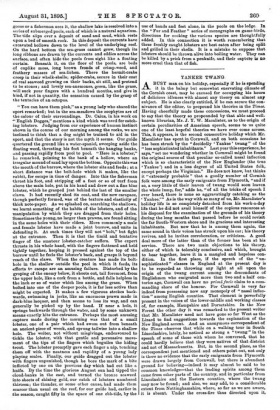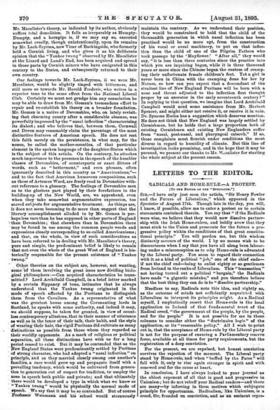YANKEE TWANG .
ABUSY man on his holiday, especially if he is spending it in the balmy but somewhat enervating climate of the Cornish coast, may be excused for occupying his hours of delicious idleness with almost any theory on almost any subject. He is also clearly entitled, if he can secure the con- nivance of the editor, to propound his theories in the Times. Having cheerfully made these concessions, we must proceed to say that the theory so propounded by that able and well. known librarian, Mr. J. Y. W. Macalister, as to the origin of certain peculiarities of American speech, seems to us quite one of the least hopeful theories we have ever come across. This, it appears, is the second consecutive holiday which Mr. Macalister has spent in Cornwall, and on both occasions he has been struck by the "decidedly ' Yankee' twang" of the " less sophisticated inhabitants." Last year this experience, he says, " set me wondering whether in Cornwall might be found the original source of that peculiar so-called nasal inflection which is so characteristic of the New Englander (the true ' Yankee') and in a less degree of all United States folk, except perhaps the Virginian." He does not know, but thinks it "extremely probable" that a goodly number of Cornish folk were among the early emigrants from Plymouth, "and if so, a very little of their leaven of twang would soon leaven the whole lump, for," adds he, "of all the tricks of speech I ever heard, there is none so aggravatingly catching as the Yankee." As is the way with so many of us, Mr. Macalister's holiday life is so completely detached from his work-a-day life that he did not avail himself of the copious resources at his disposal for the examination of the grounds of his theory during the long months that passed before he could revisit the far South-Western shore and its gracious and interesting inhabitants. But now that he is among them again, the same sound in their voices has struck upon his ear ; his theory revives, and he invites corroboration, or criticism. A good deal more of the latter than of the former has been at his service. There are two main objections to his theory, either of which is tolerably conclusive, and which, brought to bear together, leave it in a. mangled and hopeless con- dition. In the first place, if the speech of the " un- sophisticated" classes in England at the present day is to be regarded as throwing any light at all upon the origin of the twang current among the descendants of Englishmen who emigrated more than two and a half cen- turies ago, Cornwall can have no prima facie claim to a com- manding share of the honour. For Cornwall is very far indeed from possessing now auy monopoly of "nasal inflec- tion" among English counties. That element is powerfully present in the voices of the lower-middle and working classes of, for example, Hampshire and Dorsetshire. In the New Forest the other day it was remarked to the present writer that Mr. Macalister need not have gone so far West as the Lizard to find suggestions towards the explanation of the New England accent. And an anonymous correspondent of the Times observes that while on a walking tour in South Lincolnshire, lately, he noticed so strong a " twang " in the speech of some of those with whom he conversed, that he could hardly believe that they were natives of that district and not of Massachusetts. But, in the second place, as the correspondent just mentioned and others point out, not only is there no evidence that the early emigrants from Plymouth were drawn largely from Cornwall, but there is abundant ground for believing—indeed it may almost be said to be common knowledge—that the leading spirits among them came from other parts of the country, and in particular from Lincolnshire and the Eastern counties, where the twang may now be found ; and also, we may add, to a considerable extent from Nottinghamshire, where, so far as we are aware, it is absent. Under the cross-fire thus directed upon it,
Mr. Macalister's theory, as indicated by its author, obviously suffers total demolition. It falls as irreparably as Humpty- Dumpty, and a hornpipe is, if we may say so, executed somewhat cruelly, though unintentionally, upon its remains by Mr. Lach-Szyrma, now Vicar of Barkingside, who formerly held a Cornish living, and who gives it as his deliberate opinion that the "Yankee twang" observed by Mr. Macalister at the Lizard and Land's End, has been acquired and spread in those parts by Cornish miners who have emigrated in this century to the States, and subsequently returned to their own country.
Our feelings towards Mr. Lach-Szyrma, ii we were Mr. Macalister, would be slightly tinged with bitterness, and still more so towards Mr. Harold Frederic, who writes in a superior tone to the same effect from the National Liberal Club. Certainly we must not grudge him any consolation he may be able to draw from Mr. Goman's tremendous effort to repair and re-establish his theory on a broader foundation. Mr. Goman is a native of Devonshire, who, on lately revisit. ing that charming county after a considerable absence, was powerfully impressed by the " nasal inflection " characterising its dialect ; and who believes that, between them, Cornwall and Devon may reasonably claim the parentage of the most distinctive features of American speech. He does not rest this faith merely on the persistence, in what may, for the nonce, be called the mother-counties, of that particular element in the spoken language of the daughter-States which is the subject of this article. On the contrary, he attaches much importance to the presence in the speech of the humbler classes of Devonshire, of counterparts or exact dittoes of words, such as " betterment," and even phrases, often ignorantly described in this country as " Americanisms,"— and to the fact that American humorous compositions, such as those of Artemns Ward, are freely read in Devonshire with- out reference to a glossary. The feelings of Devonshire men as to the glorious part played by their forefathers in the building-np of the New World, are, we apprehend, even when they take somewhat argumentative expression, too sacred subjects for argumentative treatment. As things are, it does not seem becoming to do more than suggest that the literary accomplishment alluded to by Mr. Goman is per. haps less rare than he has supposed in other parts of England than Devonshire ; that elsewhere than in Devonshire there may be found in use among the common people words and expressions closely corresponding to so-called Americanisms; and that, on the whole, in view of such considerations as have been referred to in dealing with Mr. Macalister's theory, pure and simple, the predominant belief is likely to remain that not even the whole of the great West of England is his- torically responsible for the present existence of " Yankee twang."
Other theories on the subject are, however, not wanting, some bf them involving the great issue now dividing biolo- gical philosophers :—Can acquired characteristics be trans- mitted P Lord Archibald Campbell, in a brief letter marked by a certain flippancy of tone, intimates that he always understood that the Yankee twang originated in the mode of speech affected by the Puritans to distinguish them from the Cavaliers. As a representative of what was the greatest house among the Covenanting lords in Scotland, he speaks with some authority, and indeed it may, we should suppose, be taken for granted, in view of count- less contemporary allusions, that in their manner of utterance as well as in the tenor of their talk, their habit, and the style of wearing their hair, the rigid Puritans did cultivate as many distinctions as possible from those whom they regarded as their worldly opponents. As a mark of religious or political separation, all these distinctions have with us for a long period ceased to exist. But it may be contended that as the New England States were predominantly settled by Puritans of strong character, who bad adopted a "nasal inflection" on principle, and as they married closely among one another's families, a race would grow up and propagate itself with a prevailing tendency, which would be cultivated from genera- tion to generation out of respect for tradition, to employ the nose in speech both public and private ; and that ultimately there would be developed a type in which what we know as "Yankee twang" would be physically the normal mode of speech. We say that it may be so contended. But of course Professor Weismann and hie school would strenuously
maintain the contrary. As we understand their position, they would be constrained to hold that the child of the thousandth generation in which nasal inflection has been practised would be no more apt, from the construction of his vocal or aural machinery, to put on that inflec- tion than the child of one of the Pilgrim Fathers who took passage by the 'Mayflower.' "After all," they would say, "it is less than three centuries since the practice into which you are inquiring began, while it is three thousand years or more since the Chinese began the custom of cramp- ing their unfortunate female children's feet. Yet a girl is never born in China with the cramping done for her by Nature, so how can you expect that a descendant of the straitest line of New England Puritans will be born with a. nose and throat adjusted to the inflection first thought. proper by an ancestor in the early seventeenth century ? ". In replying to that question, we imagine that Lord Archibald Campbell would need some assistance from Mr. Herbert. Spencer, and might either not receive it, or receive it in vain. Dr. Symons Eccles has a suggestion which deserves mention. He does not think that New England was largely settled by Cornishmen, but he holds that a large proportion both of existing Cornishmen and existing New Englanders suffer from "nasal, post-nasal, and pharyngeal catarrh." If so, those complaints must flourish under conditions the most diverse in regard to humidity of climate. But this line of investigation looks promising, and in the hope that it may be pursued, we present our thanks to Mr. Al.:_calister for starting the whole subject at the present season.



































 Previous page
Previous page